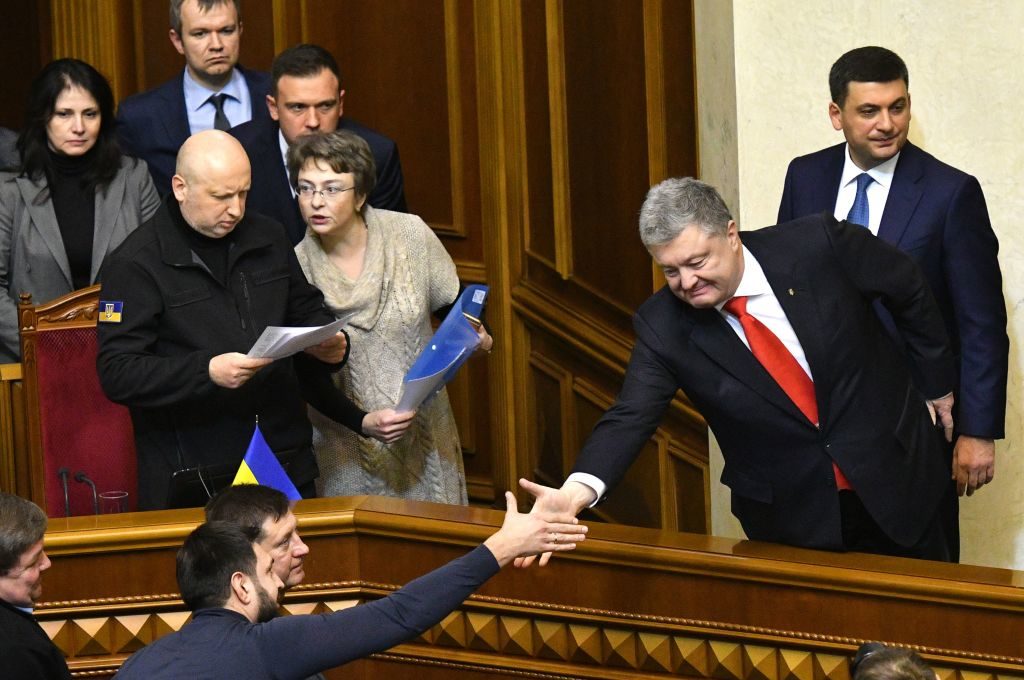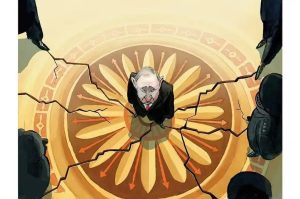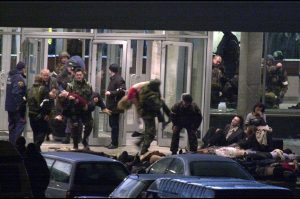Although seldom noticed by anyone west of Warsaw, there has been a war going on in Europe for almost five years now. It began in early 2014 with a Russian secret operation in mid-February that annexed Crimea and soon spread to overt Kremlin military intervention in eastern Ukraine as well. Serious fighting followed, and that conflict remains unfrozen and deadly.
While there has been no sustained combat in eastern Ukraine in years, neither is that front quiet. Kiev has never accepted the Russian theft of Crimea and the ‘people’s republics’ in Donetsk and Luhansk, Kremlin-run pseudo-states that serve as bases for Russian military units on Ukrainian soil. Those units regularly shell Ukrainian positions, because they can. Casualties are commonplace – a few at a time, on a sufficiently low-boil that the West makes little fuss – but hundreds of Ukrainian troops have been killed or wounded since 2015. Twelve were lost to Russian shelling, with five of them dead, on one bad day this August.
As is his wont, Russian President Vladimir Putin occasionally turns up the heat on Ukraine, because he can. The latest aggressive Kremlin provocation came on Sunday, when Russian Coast Guard vessels in the Black Sea attacked Ukrainian navy boats in the strategically vital Kerch Strait, which divides Crimea from Russia. For months, tensions have been rising around the narrow waterway, particularly since Moscow opened a bridge across it in May. This is the sole land connection between Russia and its Crimean reconquest and is therefore of preeminent importance to the Kremlin.
To show who’s boss, a Russian Coast Guard vessel rammed a Ukrainian tugboat and instigated a confrontation at sea that came to cannon-fire and resulted in the wounding of six Ukrainian sailors and the seizure of two Ukrainian navy patrol boats and their crews, 23 men in all. True to form, the Kremlin has accused Kiev of being the provocateur here, doing a victory lap while treating the captured Ukrainians as criminals rather than prisoners of war. Moscow maintains that Ukraine caused this crisis with the secret support of the West, especially the United States.
There’s no evidence for that, on the contrary the whole operation reeks of a spy-game of the sort Moscow excels at. Their coast guard belongs to the powerful Federal Security Service or FSB, and it seems likely that Ukrainians walked into an FSB trap here. Kiev has admitted that counterintelligence officers of Ukraine’s Security Service were aboard the captured patrol vessels. Given the current Ukrainian government’s proclivity to harebrained secret operations, it’s easy to surmise that Kiev got played by the Kremlin, yet again.
Neither Moscow nor Kiev shows any signs of backing down. President Putin’s motivations aren’t difficult to decipher. Russia’s economy is ailing thanks to Western sanctions dating from Crimea’s seizure, and Putin’s unpopular pension reform scheme has lowered his numbers in opinion polls. A long winter lies ahead and showing upstart Ukraine who’s boss is a pleasant distraction. It’s also payback for Kiev’s recent opening of a religious front in the festering conflict between Russia and Ukraine.
The fall campaign by Petro Poroshenko, Ukraine’s president, to bring his country’s divided Orthodox churches under Kiev’s control, prying thousands of parishes and several prominent monasteries and cathedrals away from the Russian Orthodox Church, proved popular among Ukrainian nationalists yet sparked outrage in Moscow, not merely among Putinists. Furious Russian clerics promised payback for this spiritual affront, and it seems that President Putin, one of their parishioners, just delivered in the Kerch Strait.
Poroshenko made church matters a political issue ahead of presidential elections at the end of March. Ukraine’s president reckons, accurately, that standing up to Moscow improves his chances of reelection. Most Ukrainians are tired of Russian bullying and the endless war in the east of their country. However, they are also weary of endemic corruption and theft by Ukraine’s political class, so it’s easy to see why President Poroshenko may welcome heightened tensions with the Kremlin.
Poroshenko’s now turning up the heat too, starting with a declaration of martial law for a month, in response to the weekend’s confrontation at sea. Ukraine’s military has gone on high alert, while top security officials are making ominous noises about an impending Russian all-out invasion of their country. That seems unlikely, with winter coming, even though some officials on the General Staff in Moscow have long wanted to connect Russian-occupied eastern Ukraine with Crimea via a land-bridge along the Black Sea coast.
However, a wider war is something which President Putin has cautiously avoided ever since his aggression against Ukraine started nearly five years ago. He fears domestic turmoil, worsened by difficult economic times, and thousands of dead Russian soldiers isn’t something the Kremlin needs right now.
The Russian military would prevail against Ukraine, a fact that Kiev surely knows. Ukraine’s navy barely exists – most of it was stolen then rolled into Russia’s Black Sea Fleet in 2014 – and their air force isn’t much better. Although Ukraine’s ground forces have made significant strides over the last four years, streamlining bloated structures, cashiering deadwood, and training a new generation of soldiers with NATO’s help, they would lose to Russia in any sustained campaign.
Nobody sensible in Kiev or Moscow wants a bigger war right now; both sides can live with low-intensity fighting in Ukraine’s east, punctuated by occasional crises like what unfolded this weekend. Kiev has few promising military options. If President Poroshenko is smart, he will stop giving Moscow propaganda fodder by doing foolish things like declaring martial law, focusing instead on reminding the world that a good chunk of his country remains occupied by the bully-in-chief in the Kremlin.
More than anything right now, Ukraine needs Western diplomatic support. Defeating Russia on the battlefield is a pipe-dream, therefore Kiev must re-focus the world’s attention on Moscow’s continuing aggression against Ukraine. While Americans and others in the West fret about Kremlin cyber-aggression, every day Ukrainians weather very real Russian aggression by shot and shell. Time is on Kiev’s side in Ukraine’s conflict with Russia – if they use it wisely.

























